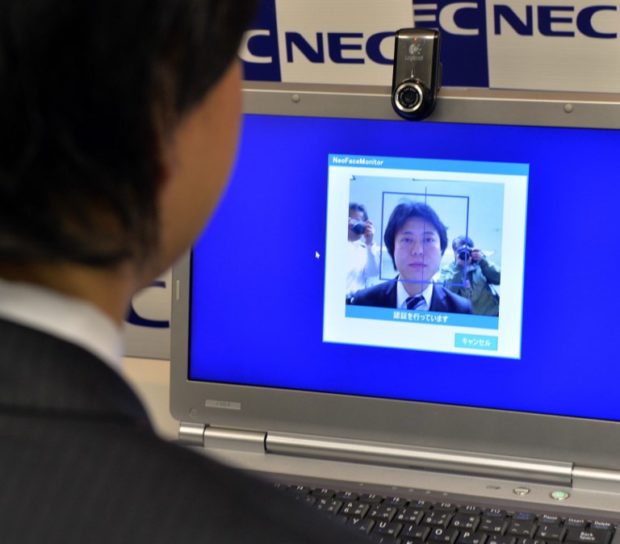
Japan’s electronics giant NEC employee demonstrates the company’s biometric security system for PC “NeoFace Monitor” using the company’s facial recognition technology at the company’s headquarters in Tokyo on April 22, 2014. In Las Vegas, federal authorities ended the 25-year run of a criminal who was rearrested after a similar facial recognition technology tagged him when he tried to renew a state ID card. AFP
LAS VEGAS, United States — A man who fled federal custody more than 25 years ago couldn’t escape new-age crime fighting, thanks to facial recognition technology.
The Nevada Department of Motor Vehicles said it nabbed 64-year-old Robert Frederick Nelson in June as he tried to renew his state identification card. Nelson has since been turned over to the Federal Bureau of Prisons. He’s expected to serve his remaining sentence and additional time for fleeing federal custody in 1992.
Federal authorities aren’t clear on how Nelson fell through the cracks for so long, said Chris Clifford, a spokesman for the U.S. Marshals Service in Minneapolis.
“We almost had to rebuild the entire case,” he said.
Nevada DMV spokesman Kevin Malone said a technician processing Nelson’s paperwork at the North Las Vegas station called agency investigators after noticing something suspicious about him. Nelson’s left the DMV unaware a full-scale probe would follow by officers in the department’s Compliance Enforcement Division who investigate identity theft and related issues.
“The facial recognition was only part of it. It was good, old-fashioned police work,” Malone said.
The investigators discovered Nelson’s ID card photo resembled another man: Craig James Pautler, who had a commercial driver’s license and a state ID card dating back to 1993. Nelson began using his true identity in 2013 when he got an ID card under his real name, which he attempted to renew last month. In Nevada, people apply for identification in person and leave with a paper detailing their information. The DMV processes the application, and if approved will mail the identification card to the applicant.
In the case involving Nelson, the resemblance between the two identities prompted investigators to run his criminal history. They found felony convictions under both names, and that he had eluded federal authorities in Minnesota for decades. Nevada officials called to inform him of a problem with his application and asked him to return to the DMV office, where he was arrested June 20.
Malone said the DMV has used a facial recognition technology since 2008, after moving to a central processing system for all state-issued ID cards to tighten security. The technology is strictly for mug shots and isn’t the higher-tech type that can pick people out of a group. The facial recognition software shows possible matching faces, allowing the DMV to further scrutinize applications. Malone said most cases just link similar-looking photos but the department catches ID fraud two to three times a month.
“We’ve caught a lot of ID theft and ID fraud cases,” said Malone. “This is the first time I’m aware of that we’ve captured an escaped prisoner.”
The program pre-dates the state’s compliance with the federal Real ID Act of 2005, which required all states to enhance ID standards. The process and regulations for state IDs were more lenient before 9/11, which Malone said is probably how Nelson got his other identification documents.
Federal court records from Minnesota show that Nelson was arrested in January 1990 and charged with six counterfeiting counts. Under his plea agreement, he pleaded guilty to one count and the rest were dropped. U.S. District Judge Robert Renner sentenced him in May 1990 to 2½ years imprisonment.
Nelson was listed as having escaped from the Federal Medical Center in Rochester, Minnesota, in 1992, Clifford said, but he didn’t know the circumstances.
Nelson somehow ended up in state custody in Nevada in 1992 or 1993, and the Marshals Service filed a “detainer” to return him to federal authorities after Nevada was finished with him, Clifford said. But he said Nevada released Nelson without telling them.
Marshals Service officials didn’t learn Nelson was free until they were contacted by Nevada investigators, who “did a great job of putting two and two together,” said Clifford. CBB
Associated Press